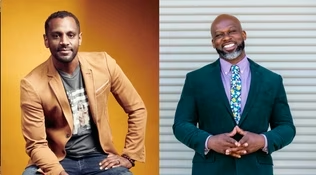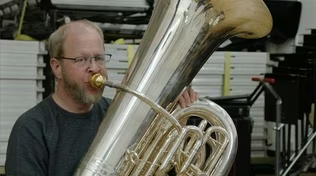This Is Minnesota Orchestra
Creating Brea(d)th with Simon and Joseph
Clip: Season 5 Episode 6 | 7m 4sVideo has Closed Captions
The creative partners behind the new piece brea(d)th discuss the process of their work.
Composer Carlos Simon and Librettist and Spoken Word Artist Marc Bamuthi Joseph arrive in Minneapolis for an early reading of brea(d)th, a new work commissioned by the Minnesota Orchestra. It is a yearning admonition for repair made in honor of George Floyd and in reflection of those who have gone too soon. The pair embrace the aspiration of racial equity through music-centered community healing.
Problems playing video? | Closed Captioning Feedback
Problems playing video? | Closed Captioning Feedback
This Is Minnesota Orchestra is a local public television program presented by TPT
This Is Minnesota Orchestra
Creating Brea(d)th with Simon and Joseph
Clip: Season 5 Episode 6 | 7m 4sVideo has Closed Captions
Composer Carlos Simon and Librettist and Spoken Word Artist Marc Bamuthi Joseph arrive in Minneapolis for an early reading of brea(d)th, a new work commissioned by the Minnesota Orchestra. It is a yearning admonition for repair made in honor of George Floyd and in reflection of those who have gone too soon. The pair embrace the aspiration of racial equity through music-centered community healing.
Problems playing video? | Closed Captioning Feedback
How to Watch This Is Minnesota Orchestra
This Is Minnesota Orchestra is available to stream on pbs.org and the free PBS App, available on iPhone, Apple TV, Android TV, Android smartphones, Amazon Fire TV, Amazon Fire Tablet, Roku, Samsung Smart TV, and Vizio.
Providing Support for PBS.org
Learn Moreabout PBS online sponsorship(orchestra warming up) - We had an amazing workshop reading of our piece, "brea(d)th."
This is a rare opportunity that composers don't usually get when you're commissioned.
Usually, it's like you get the commission and then the premiere and that's it.
(orchestral music) - That's what you're looking for?
- Yeah.
But with this particular opportunity, I actually got a chance to hear the piece before, and it's great because I can change stuff now.
- Do you want a little bit more rhythmic?
- Some action.
I see what you're saying.
- "brea(d)th" is a piece for spoken word orchestra and chorus that remembers George Floyd, the ancestor, thinks about American promise and yearns for an equitable American future.
It's a piece that is composed in four movements that follows an arc located in the word breadth, B-R-E-A-(D)-T-H, with the D in parentheses, brea(d)th to mean bread as in give us this day our daily bread.
Brea(d)th as in breath, the sustaining force of life and brea(d)th, as in the brea(d)th of the promise, the brea(d)th of the task.
- Do you remember 2020?
Do you remember its brea(d)th?
- This is not the first piece that I've written in response to injustice.
In fact, I wrote my first piece in 2014.
Trayvon Martin was murdered, a piece called "Elegy: A Cry from the Grave."
(orchestral music) Years later to see George Floyd suffer these same injustices, it just felt like, "What are we doing?"
And it was hard for me to see 'cause there was no progress.
It was actually getting worse.
So when the Orchestra asked me to write the piece, I almost said no.
I felt like I had done what I was supposed to do and nothing was happening.
Then Bamuthi came into the picture and sort of gave me some some spark of hope.
I think we could do something different here.
I think we can say something different other than focusing on this moment, the tragedy.
So hopefully this piece says something different and hope for change.
What's the brea(d)th of the task after this?
- We wanted to make a work that didn't kind of micro-locate us in time or space, one corner for 10 minutes in May of 2020.
We wanted to think about the breadth of an entire life, and how that life fits in with the continuum of American lives, and how those American lives intersect with a long history that goes back before Columbus, back before a constitution, and extends forward beyond the rigors and the tragedy of the pandemic.
How does music serve as both an oracle and point of intersection, but also as a bridge from a troubled American past to an aspirational American future?
- Bamuthi, hey man.
- Yeah, brother.
- With this particular project, I knew that I wanted Bamuthi to be front and center.
Having him in front of the orchestra would give the piece something, give it life.
- Back to the wind so our spirit might hear it and vibrate, a mitzvah incarnate, and back again, reciprocal- - The choir is important element here because he's saying small phrases that mean a lot, so I wanted to use the chorus in a way that they accent or repeat those small phrases over and over again.
- It's also symbolically important.
Our artistic path encompassed the mining of experiences and expertise and training to codify and organize words, and codify and organize notes and melodies, but the experiences that we were mining, besides our personal biographies, were also the experiences of the American community, maybe most specifically the community in the Twin Cities, but the global community.
It was one of those rare moments in time where we were all experiencing a thing together.
Yeah, there's power in having a community of voices, but there's also kind of symbolic consistency of having a community of voices participate in the ritual and execution of the music.
So it was also really important that this reading was open to the community and that so many members of the local community that inspired the work, people that we consider ourselves energetically accountable to.
Basically the landscape of stakeholders was present and was able to engage in the discovery of the work as we were making discoveries too.
Before the sun rose that day, the corner was already cursed.
- The music and the words definitely struck my heart definitely as a person of color in America and Minnesota.
It was very heart-wrenching listening to everything.
- This is a thing that most of us have lived through, not only the pandemic but the uprising, and it feels like it was just all portrayed really well, really emotionally.
(audience applauding) - One of the things that we've been talking about is the lack of inevitability of any of our lives or of the direction of our country, that people make the thing, so you don't want to just prepare yourself to listen 'cause there's a lot of rich stuff to listen to.
But I think you also want to prepare yourself to dream, and maybe that's also what the work does.
It invites collective and community dreaming of what comes next.
Preview: S5 Ep6 | 30s | Brea(d)th by Carlos Simon and Marc Bamuthi Joseph, and Wynton Marsalis’ Tuba Concerto. (30s)
Principal Tuba Steven Campbell
Video has Closed Captions
Clip: S5 Ep6 | 6m 37s | Principal Tuba Steven Campbell discusses the tuba before performing Marsalis' Concerto. (6m 37s)
Providing Support for PBS.org
Learn Moreabout PBS online sponsorship

- Arts and Music
The Best of the Joy of Painting with Bob Ross
A pop icon, Bob Ross offers soothing words of wisdom as he paints captivating landscapes.












Support for PBS provided by:
This Is Minnesota Orchestra is a local public television program presented by TPT


